This month we feature the obituary of Daniel Harrwitz from The Chess-monthly, Volume 5, September 1883 – August 1884, and an excerpt from The British Chess Review, January 1853. We have updated the notation where appropriate and added images and diagrams.
Daniel Harrwitz
by Mark Donlan
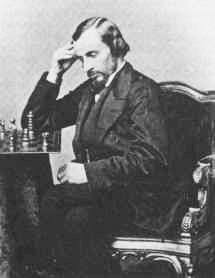
Daniel Harrwitz
Death of Daniel Harrwitz, The Chess-monthly, Volume 5, September 1883 – August 1884
One more link from the chain, connecting the past generation of Chess players with the present, has been severed through the death of Daniel Harrwitz, which occurred about two months ago at Botzen, Tyrol. Few masters, Anderssen excepted, leave such a splendid record as the late Harrwitz.
During the fifteen years of his active Chess career – from 1845, when his name first came into notice in Paris, up to his retirement in 1862 – he stood prominently out in the first rank, in the dual capacity as a practical player and writer of eminence. Physically of a frail constitution, the slight reverses he experienced at the hands of the then youthful heroes, Morphy and Kolisch, told severely on a naturally sensitive temperament, and were the cause which prompted his early retreat from the Chess arena, when he felt that his power was on the wane. This step taken by Harrwitz is evidence of a great deal of common sense, and might serve as an example worthy of imitation, not only in Chess, but also by votaries of other sciences and arts, under similar circumstances. His choice fell on a secluded nook of the Tyrolese mountains, from which he only emerged once some six years ago, when he visited England again. “He wished to see old friends and the scene of his glories once more,” he said, “before he died.” We made his acquaintance then, and had the rare advantage of admiring his sparkling wit at the convivial meetings of the West-End Chess Club. Harrwitz was a clever conversationalist, and full of anecdote and reminiscences. His health seemed unimpaired both in body and in mind, and there were certainly no signs of an early end noticeable. The following salient events of his Chess career we quote from the Field:
“Herr Harrwitz was a native of Breslau, and became notorious in Paris in 1845, especially as a gifted blindfold player. Twelve months later he visited England, and contested a match with Howard Stannton; but was defeated in a series of twenty-one games. The conditions were – seven games to be played on even terms; in seven the English champion to concede the odds of Pawn and move; and in seven the odds of Pawn and two moves. Harrwitz, who was quite a youth then, lost all the even games, the majority of the Pawn and two games; but, strange to say, won the Pawn and move series. Later on he contested a match with Horwitz, beating him by six to four; and also won a short match of Williams. After a stay of two years in England he returned to Germany; but in 1849 we find him again in London, as a regular frequenter of the St. George’s Chess Club. In 1853 he established the British Chess Review, and conducted it very ably during the short period of its existence. About that time Löwenthal appeared on the scene, and a match was arranged between the two rivals. This match proved the most exciting contest which ever took place. The conditions were, the winner of the majority out of twenty-one games to be the victor. Harrwitz won the first two games, and, suffering from a severe cold, Löwenthal scored seven games running, and two draws. Harrwitz went to Brighton to restore his health, thereby forfeiting two more games. The score then stood – Löwenthal, nine; Harrwitz, two, and two draws. Harrwitz returned to town invigorated in health, and steadily won game after game, and the match. The final score was: Harrwitz, eleven; Löwenthal, ten, and twelve draws. Shortly afterwards he left England for Paris, and greatly contributed to popularise Chess in France. He defeated Mr. Amous de Riviere, n rising young player then, by a score of 5 to 2. Harrwitz’s successful career was, however, marred by the advent of the youthful American star, Paul Morphy, who arrived in Paris in 1858, and challenged Harrwitz to a match. After scoring the first two games, the latter lost the next five, when, pleading ill-health, he resigned the match to the youthful hero. Two years later another genius, Kolisch, appeared, and defeated Harrwitz; after which, seeing his star was on the decline, he quitted Paris, and lived a retired life in the romantic mountains of the Tyrol.”
In concluding we desire to entirely endorse the censure passed by the Field upon the German Chess Press for the scanty notice, or rather want of notice, taken by them of the loss of their eminent countryman. Even the Schachzeitung for March confines itself to the bald announcement, without a word of further comment. Some mark of respect, though tardy, will be expected by the English, French, and American Chess-players. We may add a word of praise for the elaborate sketch of Harrwitz’s career given in the New Orleans Times Democrat. The Chess Column in that paper is most admirably conducted, and by far the best in America.
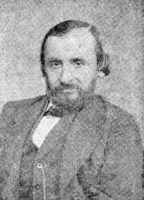
Daniel Harrwitz
Match between Messrs. Williams & Harrwitz, The British Chess Review, January 1853
Our next five games are part of a match just concluded, between Messrs. Williams and Harrwitz. The match in question being one of two which were arranged to be played between these gentlemen by the London Chess Club. The terms on which the two matches were to be played, proposed by the London Chess Club with that spirit and liberality which have always distinguished this circle of amateurs, were as follows: On the conclusion of each match a handsome prize to be divided between the players in the proportion of three-fourths of the amount to the winner, and one fourth to the loser. The player first winning seven games, in each match, to be declared victor; the matches to be played throughout at the London Club; and in the second or return match, every game to be commenced with the move of 1. K. P. 2 on each side.
The first match, of which the five ensuing games are a part, commenced on the 29th October, and terminated on the 30th November, play having taken place twice a week; the score standing at the close thus – Mr. Harrwitz, 7; Mr. Williams, 0 drawn 3.
Harrwitz,Daniel – Williams,Elijah
London (1), 1852
French Exchange Variation [C01]
The duration of this hard-fought game was five hours and a half.
1.e4 e6 2.d4 d5 3.exd5 exd5 4.c4 Nf6 5.Nc3 Nc6 6.Nf3 h6 7.cxd5 Nxd5 8.Bc4 Nxc3 9.bxc3 Bd6 10.0-0 0-0 11.h3 Qf6 12.Bd3 Ne7 13.Be3 Nd5 14.c4 Ne7 15.c5 Bf4 16.Qd2 Ng6 17.Bxg6 fxg6 18.Bxf4 Qxf4 19.Qxf4
This was precipitately played, and serves only to relieve White.
19…Rxf4 20.Kh2 Be6 21.Rad1 Bd5
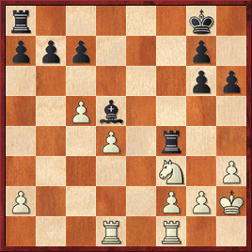
[FEN “r5k1/ppp3p1/6pp/2Pb4/3P1r2/5N1P/P4PPK/3R1R2 w – – 0 22”]
Better to have taken the a2-pawn; but White’s design was to break up the pawns on the adverse kingside.
22.Ne5 Kh7 23.a3 Raf8 24.f3 R8f6 25.Rd3 Ra6 26.g3 Rff6 27.Re1 Ra4 28.Ree3 Ra5 29.Kg2 Rb5 30.Kf2 c6 31.Rd2
Black observed that he ought here to have advanced his h-pawn.
31…g5 32.h4 gxh4 33.gxh4 Rb1
This is a strong move, and renders Black’s play very difficult.
34.Ng4 Rf7 35.Kg2 Rf4 36.Kg3 Rf5 37.Kg2 Rh5 38.Kg3 Rg1+ 39.Kh2 Rb1 40.Kg3 Rf5 41.Kg2
Black’s object is ever to prevent White from playing Re8.
41…b5 42.cxb6 Rxb6 43.Rdd3 Rb7 44.Re5 Rf4 45.Kg3 Rbf7 46.Ree3 R4f5 47.Ne5 R7f6 48.Rd2 Re6
Threatening to push …c5.
49.Rc3 Ref6 50.Rb2 Rf4 51.Rb4 a6 52.Ra4 a5
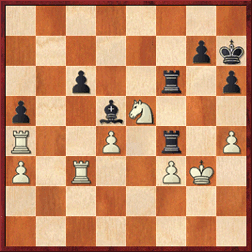
[FEN “8/6pk/2p2r1p/p2bN3/R2P1r1P/P1R2PK1/8/8 w – – 0 53”]
53.Rxc6 Bxf3 54.Rxa5
Unexpected – the winning coup.
[A strange sequence here, but all the sources agree as to the game score. 53.Rxc6 loses to Bxc6, which again could be played at move 54; while 53…Bxf3 loses to 54.Rxf6.-ed.]
54…Rf8 55.Rc7 Be4 56.Raa7 Rf1 57.Rxg7+ Kh8 58.Raf7
This seems to be almost Black’s only safe move, but on examination it proves to be very efficient.
58…R1xf7 59.Rxf7 Ra8 60.Kf4 Bg2 61.Ng4
Threatening, if Rxa3, to play the Nf6, which would decide the game at once.
61…Bd5 62.Rf6 Kg7 63.Rxh6 Rxa3 64.Rd6 Bf7 65.Rd7 Kf8 66.Ne5 Be6 67.Ng6+ Kg8 68.Re7 Bd5 69.h5 Bf7 70.Kg5 Rd3 71.Rxf7
Well played.
71…Rg3+ 72.Kf4 Rg1 73.Rf5 Kg7 74.d5 Rd1 75.Ke5 Re1+ 76.Kd6 Resigns
Williams,Elijah – Harrwitz,Daniel
London (2), 1852
Bird’s Opening [A03]
1.f4 d5 2.e3 c5 3.Nf3 Nc6 4.b3 Nf6 5.Bb5 Bd7 6.0-0 e6 7.Qe2 Be7 8.d3 0-0 9.c4 a6 10.Bxc6 Bxc6 11.Nbd2 Nd7 12.e4 d4 13.e5 f5 14.exf6 Rxf6 15.Ne4 Rg6 16.Bd2 Qc7 17.Rae1 Re8
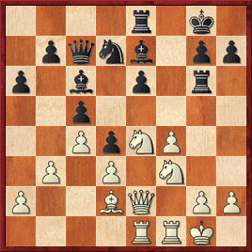
[FEN “4r1k1/1pqnb1pp/p1b1p1r1/2p5/2PpNP2/1P1P1N2/P2BQ1PP/4RRK1 w – – 0 18”]
White could not have played either Kt. to g5 with any advantage, for suppose 18.Ng5 Bxg5 19.Nxg5 Kh8 20.Qh5 Nf8 21.Nf3 (or 21.Ne4) 21…Bxf3 22.Rxf3 Qc6 with a fine game.
18…h6 19.h4 Bxe4 20.Qxe4 Rf6 21.g4
White is now coming on in a vigorous style.
21…Bd6 22.g5 Rf5 23.gxh6 Nf6 24.Qe2 gxh6
Black prefers this to taking …Bxf4, on account of White’s threatened move of Rg2.
25.Ne5 Bxe5 26.Rg2+
Better than at once taking the Bishop.
26…Kh7 27.fxe5 Nh5 28.Qe4 Qf7
This is a lost move, he should have played …Rg8.
[Actually Black should have played 28…Re7=/+.-ed.]
29.Kh2 Rf8 30.Reg1 Qc7 31.Rg6
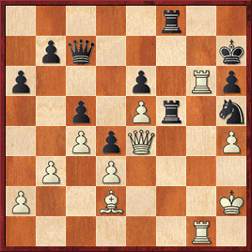
[FEN “5r2/1pq4k/p3p1Rp/2p1Pr1n/2PpQ2P/1P1P4/P2B3K/6R1 b – – 0 31”]
The only move Black has to save the game; the position is now highly critical.
32.Rxf6 Nxf6 33.Qg2 Qxe5+ 34.Kh1 Qc7 35.Qg6+ Kh8 36.Bxh6 Qh7
Again his only saving clause.
[36…Qc6+ was also playable.-ed.]
37.Bg7+ Kg8 38.Qg3 Nd7
The best move, we believe, at this juncture.
39.Bxd4+ Kf7 40.Be3
Black [White-ed.] would have done better to retreat this B to c3, still threatening the check at g7, and restraining the adverse Kt.
40…Ne5 41.Bg5
If White had here taken 41.Bxc5 Black would have played in the following manner: 41…Rf3 42.Qg5 (best) 42…Rh3+ 43.Kg2 Rh2+ 44.Kg3 (best) 44…Qxd3+ 45.Qe3 (best) 45…Qxe3 Bxe3 46.Rxa2. And the game is about even; if at 42 White takes Kt. with Q he loses her.
41…b5 42.Re1 Qh8 43.Qe3 Qa8+ 44.Qe4 Qxe4+ 45.dxe4 Rf2 46.Kg1
This is a forced move, as Black menaces …Nf3.
46…Rxa2 47.Rf1+ Kg6 48.cxb5
Had White instead played the obvious move of 48.Rf6+, Black would have played in the following manner: 48…Kh5 49.Rxe6 bxc4 50.Rxe5 cxb3. And Black will regain at least the piece.
48…axb5 49.Rf6+ Kh5 50.Rxe6 Nf3+ 51.Kf1 c4 52.bxc4 bxc4 53.Rc6 Rc2 54.Rc5 Kg4 55.e5 Kg3 56.Be3 Rh2 57.Rxc4 Rh1+ 58.Ke2 Re1+ 59.Kd3 Nxe5+ 60.Kd2 Nxc4+ 61.Kxe1 Drawn game. Duration six hours and a half.
Harrwitz,Daniel – Williams,Elijah
London (3), 1852
Philidor Defense [C41]
1.e4 e5 2.Nf3 d6 3.d4 exd4 4.Bc4 Be7
By attempting to maintain the Pawn, White would get a bad game.
5.Nxd4 Nf6 6.Nc3 0-0 7.Bb3
To prevent White’s [Black’s-ed.] taking ..Nxe4, and then forking pieces with …d5.
7…Nc6 8.f4 Ng4 9.Nxc6 bxc6 10.0-0 Bf6
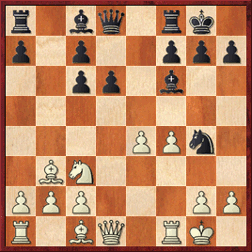
[FEN “r1bq1rk1/p1p2ppp/2pp1b2/8/4PPn1/1BN5/PPP3PP/R1BQ1RK1 w – – 0 11”]
11.h3 Bxc3 12.hxg4 Ba5 13.g3
Black [White-ed.] ought to have played g5, and he would have had a great attack.
13…Ba6 14.c4 Qe7
White’s [Black’s-ed.] strongest move was 14…d5.
15.Qd3 Rae8 16.Bc2 Qe6 17.b3 Qxg4 18.Kg2 f5 19.Bd1
Taking 19.exf5 would allow White [Black-ed.] to give a check at e2 which would have proved ultimately fatal.
19…fxe4 20.Qe3 Qc8
This is too retrograde: better to have played …Qg6, or Qd7; in the latter case, if Black [White-ed.] had taken a7 with Q. he would have lost her.
21.Bb2 Re7 22.f5
Here Black commences a powerful attack – if White [Black-ed.] takes this P. he loses the exchange.
22…Bb6 23.Qg5 Qd7 24.Bg4 Qe8 25.f6
This is decisive.
25…Ref7 26.Bh5 Bc8
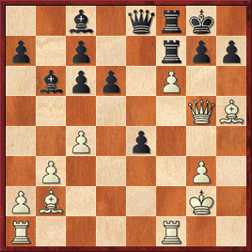
[FEN “2b1qrk1/p1p2rpp/1bpp1P2/6QB/2P1p3/1P4P1/PB4K1/R4R2 w – – 0 27”]
27.Bxf7+
Black [White-ed.] might also have taken P. with Q., checking.
27…Rxf7 28.fxg7 Qd7 29.Qh4 Rf3 30.Rae1 d5 31.Rxf3 exf3+ 32.Kxf3 Qf5+ 33.Qf4 d4 34.Qxf5 Bxf5 35.c5
35.b4 would have been more conclusive, as it leads to the winning a piece.
35…Ba5 36.Re7 Bc3 37.Bxc3 dxc3 38.Ke2 Bb1 39.Kd1 a5
Taking 39…Bxa2 would cost the piece.
40.Rxc7 Be4 41.a3 h6 42.Re7 Bf5 43.Kc1 Kh7 44.Rb7 Be4 45.b4 axb4 46.Rxb4 Bd5 47.Rb7 Be4 48.a4 Bd3 49.a5 h5 50.Rd7 Ba6 51.Kc2 Bc8 52.Rc7 Bf5+ 53.Kxc3 h4 54.gxh4 Be6 55.a6 And wins. Duration five hours.
Williams,Elijah – Harrwitz,Daniel
London (4), 1852
Queen’s Gambit Declined [D40]
1.d4 d5 2.c4 e6 3.Nc3 Nf6 4.e3 c5 5.Nf3 Nc6 6.Bd3 a6 7.a3 cxd4 8.exd4 dxc4 9.Bxc4 b5 10.Bb3 Na5 11.Bc2 Bb7 12.0-0 Rc8 13.Be3 Nc4 14.Ne5
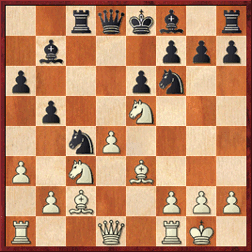
[FEN “2rqkb1r/1b3ppp/p3pn2/1p2N3/2nP4/P1N1B3/1PB2PPP/R2Q1RK1 b k – 0 14”]
14…Nxb2 15.Qe1 Nd5 16.Bd2
If Nxd5, Black retakes Kt. with Q. winning a piece.
16…Nc4 17.Nxc4 Rxc4 18.Bb3 Rxd4 19.Ne4
This is not good; but had he played 19.Ne2 the following beautiful variation might have occurred: 19…Rd3 20.Bxd5 Qxd5 21.Nf4 Qg5 22.g3 Bc5 23.Nxd3 (if) 23…Qd5 and wins. If White play 23.Nxe6, Black mates him in two moves.
19…Nc7 20.Ba5 Rxe4 21.Qc3 Rc4
He might safely have played 21…Bd6; or perhaps as best 21…Nd5.
22.Bxc4 bxc4 23.Rfd1
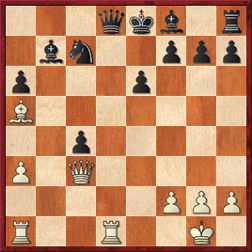
[FEN “3qkb1r/1bn2ppp/p3p3/B7/2p5/P1Q5/5PPP/R2R2K1 b k – 0 23”]
23…Qg5 24.g3 Qc5 25.Rab1 Qc6 26.Rxb7 Qxb7 27.Qxc4 Nd5 28.Rc1 f6 29.Qc2 Kf7 30.Rb1 Qa8 31.Qa4 Be7 32.Qd7 Qc8 33.Qa7 Qc2 34.Rb7 Rc8 35.Bb4 Qb1+ 36.Kg2 Qe4+ 37.Kh3 Mates in four moves. Duration four hours.
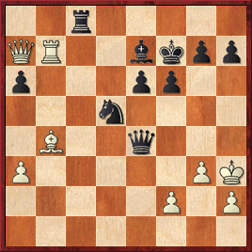
[FEN “2r5/QR2bkpp/p3pp2/3n4/1B2q3/P5PK/5P1P/8 b – – 0 37”]
London (5), 1852
King’s Gambit Declined [C30]
1.e4 e5 2.f4 Bc5 3.Nf3 d6 4.Bc4 Nc6 5.c3 Nf6 6.b4 Bb6 7.d3 a6 8.Qe2 0-0 9.f5 d5 10.Bb3 dxe4 11.dxe4 Qd6 12.Nbd2 Ba7 13.Nc4 Qe7 14.Bg5 b5 15.Ne3 Bxe3 16.Qxe3 Bb7 17.0-0 Rad8 18.h3 Rd6 19.Nh2 Rfd8 20.Ng4 Kh8
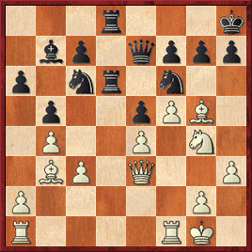
[FEN “3r3k/1bp1qppp/p1nr1n2/1p2pPB1/1P2P1N1/1BP1Q2P/P5P1/R4RK1 w – – 0 21”]
21.Nxf6
To have taken Kt. with B. would probably have proved more advantageous to Black, as the Kt. would have been more annoying to White than even the B.
21…gxf6 22.Bh4 Qf8 23.Rf3 Ne7 24.Re1 Qg7 25.Rg3 Rd3 26.Rxg7 Rxe3 27.Rxh7+
We invite the attention of students to the move of 27.Bxf6 at this point; it leads to many beautiful variations, but on White’s replying with 27…Rxe1+, and then 28…Rd6, proves scarcely so sound as the move in the text.
[28…Rd6 loses to 29.Rxf7+, but 28…Ng8 minimizes White’s advantage.]
27…Kxh7 28.Rxe3 Rd6 29.Bxf7 Kg7 30.Be6 Bc8 31.Rg3+ Kf8 32.Bxf6 Bxe6 33.Bxe7+ Kxe7 34.fxe6 Rxe6 35.Rg7+ Kd6 36.Kf2 Rf6+ 37.Ke3 c6 38.Ra7 Rf1 39.Rxa6 Re1+ 40.Kf3 Rc1 41.Ra3 Rf1+ 42.Ke2 Rh1 43.c4 bxc4 44.Rc3 Rb1 45.Rxc4 Rb2+ 46.Kf3 Rxa2 47.h4 Ra8 48.g4
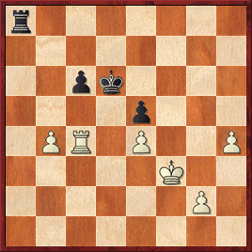
[FEN “r7/8/2pk4/4p3/1PR1P2P/5K2/6P1/8 w – – 0 48”]
48…Ra3+ 49.Kf2 Ra2+ 50.Kf1 Rh2 51.Rc3 Rxh4 52.Rg3 Rh2 53.g5 Rh7 54.Rf3
Evidently a lost move; Black [White-ed.] ought instead to have played 54.g6 or to have brought up his King.
54…Rh4 55.Rg3 Rxe4 56.g6 Rf4+ 57.Ke2 Rf8 58.g7 Rg8 59.Kd3 Kd5 60.Rg5 c5
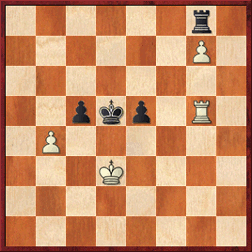
[FEN “6r1/6P1/8/2pkp1R1/1P6/3K4/8/8 w – – 0 61”]
Had Black [White-ed.] instead pushed 61.b5, it will be found, we believe, on examination, that White [Black-ed.] still draws.
[Black doesn’t-ed.]
61…Kxc5 62.Ke4 Kd6 63.Kf5 Kd5
This and White’s following move are accurately and scientifically played – any others would lose the game.
64.Kf6 Kd4 65.Kf7 Rxg7+ 66.Rxg7 e4 67.Kf6 e3 68.Kf5 e2 69.Re7 Kd3 70.Kf4 Kd2 71.Rd7+ Kc1 72.Rc7+ Kd2 73.Rd7+ Kc1 Drawn Game. Duration four hours and a half.
The instructive endgame below occurred in play to Mr. Harrwitz.
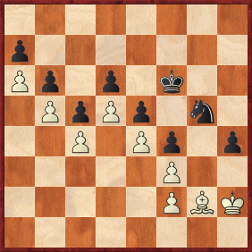
[FEN “8/p7/Pp1p1k2/1PpPp1n1/2P1Pp1p/5P2/5PBK/8 b – – 0 1”]
Download Daniel Harrwitz in PDF format. All previous Skittles Room columns are available in the ChessCafe.com Archives.
The ChessCafe.com Skittles Room is open to reader contributions. If you have an article that you would like published, please write to us via our Contact Page. If we publish your article, we will send you a free Inside Chess 1988-2000 DVD!
Copyright 2014 ChessEdu.org. All Rights Reserved.
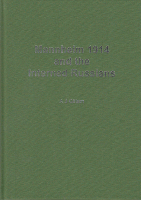
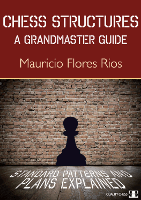

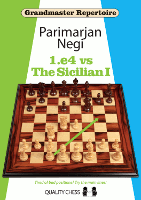
There seems to be a typo in this early sentence: “During the fifteen years of his active Chess career – from 1815, when his name first came into notice in Paris, up to his retirement in 1862 …” That’s 47 years, not 15, and in any event Harrwitz was not born until 1823. I feel sure 1845 was meant instead of 1815.
Yes, you are correct. The text recognition software mistook 1845 for 1815. We have updated the sentence. Thanks.
There’s still one more “1815” needing correction, in this passage:
“Herr Harrwitz was a native of Breslau, and became notorious in Paris in 1815 …”
Thanks!